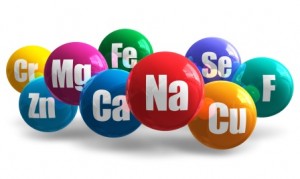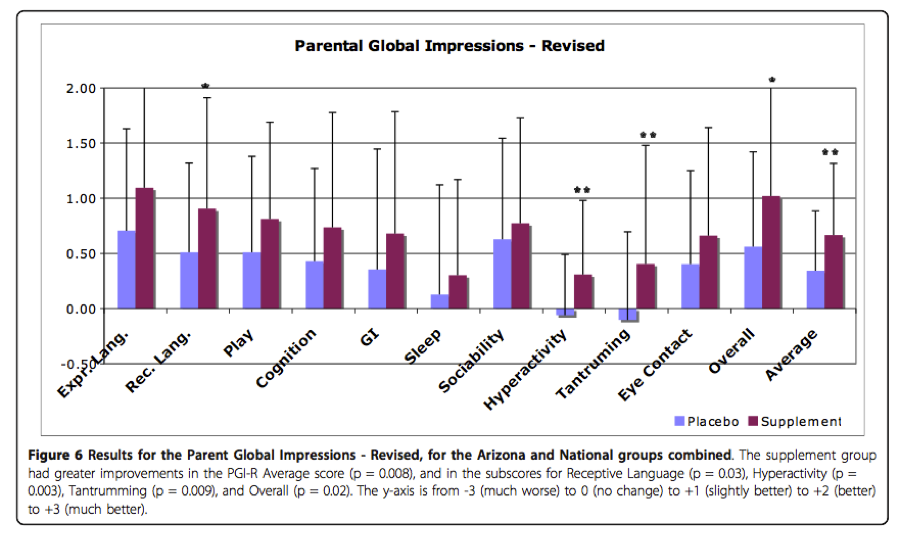 Recently, there has been quite a lot of controversy in the media (and even in the nutrition field) on whether diet and nutritional supplements can help autism. I’ve been focused on the science and application of nutrition and special diets for autism for 14 years. The scientific rationale for giving strategic attention to the food and nutrition children with autism receive is strong.
Recently, there has been quite a lot of controversy in the media (and even in the nutrition field) on whether diet and nutritional supplements can help autism. I’ve been focused on the science and application of nutrition and special diets for autism for 14 years. The scientific rationale for giving strategic attention to the food and nutrition children with autism receive is strong.
This recent “controversy” was in response to a new study that came out last week, that I feel is quite flawed. I’ll be addressing these “findings” in the coming days and look forward to sharing my broader thoughts with you.
However, before I do, I wanted to share a very important study published by Dr. James Adams, a prolific autism researcher, who has published dozens of studies on autism, and has conducted many specifically on nutritional status and supplementation in children with autism, with more to come.
Today I want to share the results from, “Effect of a vitamin/mineral supplement on children and adults with autism.”
This study is actually a follow up to another study he did. So before I get to the study on the effects of supplementation in autism, I wanted to summarize the findings in the first study, Nutritional and metabolic status of children with autism vs. neurotypical children, and the association with autism severity, described in detail here.
Researchers found deficiencies and metabolic abnormalities in children with autism, including: low levels of biotin, plasma glutathione, SAM, plasma uridine, plasma ATP, NADH, NADPH, plasma sulfate, and plasma tryptophan. The children with autism had high oxidative stress markers and plasma glutamate. Biotin was the only vitamin with a significant difference in the children – it was 20% lower in the children with autism. Interestingly, their mean levels of vitamins, minerals, and most amino acids commonly measured in clinical care were within published reference ranges.” However, while most nutrients were within “reference range,” the study found – along with the deficiencies and metabolic abnormalities above – many additional differences and deficiencies that are noteworthy:
- B5, vitamin E and total carotenoids levels showed “possibly significant” lower levels in children with autism.
- Folate and Niacin – possibly significant in autism (Functional needs assessed using FIGLU and n-methyl-nicotinamide)
- Low lithium in autism
- Twenty-five percent of the autism group was below the reference range for iodine and calcium.
- Tryptophan, a precursor to serotonin was significantly lower in the autism group. (Low tryptophan plays a role in depression and poor sleep)
- Glutamate, an excitatory neurotransmitter, was significantly higher (Glutamate is a factor in hyperactivity)
- Other differences were possibly significant such as slightly decreased tyrosine and phenylalanine and slightly higher serine.
So while most of the vitamins and mineral levels fell within “published reference ranges,” the study found many metabolic differences and a number of markers indicating deficiency and concluded that “The autism group had many statistically significant differences in their nutritional and metabolic status, including biomarkers indicative of vitamin insufficiency, increased oxidative stress, reduced capacity for energy transport, sulfation and detoxification. Several of the biomarker groups were significantly associated with variations in the severity of autism.”
The next study published by Dr. Adams, and the one I want to highlight today, looked at the “Effect of a vitamin/mineral supplement on children and adults with autism” in this same group of individuals. This study was a randomized, double-blind, placebo-controlled treatment study on the use of a vitamin/mineral formula for three months. The study used a previous version of this multivitamin/mineral formula – ANRC Essentials is now available as a slightly reformulated supplement to account for some of the findings in these studies.
The study results were impressing. In this study they found improvements in nutrient status, biomarkers, and autism symptoms. The study showed:
Vitamins
- 3 months of supplementation increased the level of most vitamins, including vitamins B1, B3, B5, B6, folate, B12, C, E, and biotin.
- The supplement also improved two functional biomarkers in urine, FIGLU and methylmalonic acid, indicating the supplement improve functional vitamin status of folate and vitamin B12.
So while vitamins were theoretically “in range” in the previous study, levels increased and improved to a more optimal level (not excess) with supplementation.
In the case of the functional biomarkers for folate and B12, this brings up an important biochemical point. For some individuals, laboratory values “appear” in normal range in the blood. However, this can be misleading as these nutrients may not be able to be utilized properly, so an actual deficiency is present. For example, with folic acid, it’s difficult for many people (such as those with methylation issues) to convert folic acid to the usable active folate form, so while levels of “folic acid” appear sufficient and “in range,” the active usable form of folate is actually insufficient and the individual is really deficient. With B12, many experts feel the standard reference range (for “normal” blood levels) is too low and some people need more, or a different form. Therefore, testing blood levels only may miss many people that are deficient. Therefore MMA which is an indicator of functional B12 status, is preferred by many clinicians and researchers to assess B12 status.
This study’s results may be illustrating these points – while levels of folic acid and vitamin B12 were in range, supplementation improved these biomarkers and likely vitamin status.
Minerals
- The supplement increased the levels of many essential minerals including: calcium, iodine, lithium, manganese, molybdenum, and selenium.
- The increase in lithium levels was large (this form of lithium was very well absorbed), so researchers felt less lithium may be better in future studies.
Biomarkers – Sulfation, Methylation, Glutathione and Oxidative Stress
The wonderful thing about this study is that it assessed biomarkers of important biochemical processes such as sulfation, methylation, and low glutathione (transsulfuration), all of which which researchers have found to be low in autism. They also measured oxidative stress, a process found to be high in autism. By studying these metabolic biomarkers and well as nutrient status, they were able to not only see what supplementation did for nutrient lab values, but what supplementation did for system and biochemical functioning. In this study they found:
- After treatment, there was a significant increase in total sulfate, and a large and marginally significant increase in free sulfate. Adequate sulfate levels are important for sulfation, for which there are hundreds of functions in the body including proper gut barrier function and detoxification.
- The level of SAM increased significantly, and there was a marginally significant decrease (improvement) in uridine, a marker of impaired methylation, indicating that supplementation may have improved methylation. Methylation is important for adequate neurotransmitter levels and gene expression.
- Reduced glutathione improved significantly and nearly normalized. Glutathione is a major antioxidant (important to neutralize oxidative stress), and has many functions including detoxification.
This means that in addition to having better levels of nutrients in the body, these nutrients helped to boost and improve functioning of many systems including biochemical processes that handle immune function, proper inflammatory response, detoxification, gastrointestinal health, and hundreds of other functions.
Symptom Improvement
Furthermore, this study also measured parents impressions from the supplementation and found improvements in every area assessed, and some were quite significant. Notice the improvements in language, hyperactive, tantruming and more.
Dr. Adams, et al. concluded in this study, “The vitamin/mineral supplement was found to be generally well-absorbed and metabolically active, resulting in improvements in biotin, glutathione, methylation, oxidative stress, ATP, NADPH, NADPH, and sulfate. The data from this study strongly suggests that oral vitamin/mineral supplementation is beneficial in improving the nutritional and metabolic status of children with autism, and in reducing their symptoms.”
This study greatly supports the use of vitamin and mineral supplementation in autism.
Study Citation:
Adams, James B., Tapan Audhya, Sharon McDonough-Means, Robert A. Rubin, David Quig, Elizabeth Geis, Eva Gehn et al. “Effect of a vitamin/mineral supplement on children and adults with autism.” BMC pediatrics 11, no. 1 (2011): 111.



